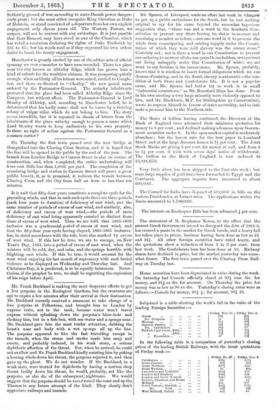Mr. Spence, of Liverpool, made an effort last week in
Glasgow to get up a public enthusiasm for the South, but be had nothing original to say for his cause beyond the somewhat ingenious suggestion that, " there was not a word in the Southern Con- stitution to prevent any State freeing its slaves to-morrow and remaining a member as before,—not one word in it to prevent the whole from emancipating and existing happily under the Consti- tution of which they were told slavery was the corner stone." Certainly not ; nor is there a word in our Constitution to prevent our enslaving to-morrow all the ten-pound householders, or to preven t our living unhappily under that Constitution of which we are wont to say freedom is the corner-stone. Mr. Spence, probably, knows that it is needless to insert formal obligations which no one dreams of resisting, and in the South slavery is axiomatic—the con- dition of both State and Confederate life. It is not a popular cause, and Mr. Spence had better try to work it in small "influential committees," as Mr. Beresford Hope has done. Even in his own meeting a very large minority were violently opposed to him, and Mr. Blackburn, M.P. for Stirlingshire (a Conservative), wrote to express himself in favour of strict neutrality, and to inti- mate a personal bias to the Northern side.






























 Previous page
Previous page